- Home
- Cynthia Ozick
Dictation Page 10
Dictation Read online
Page 10
She lay with her head against his neck. Her profile was very sharp. He had seen her head a hundred times before, in museums: the painted walls of Roman villas. The oversized eyes with their black oval shine, the nose broad but so splendidly symmetrical, the top lip with its two delectably lifted points. Nevertheless she was mysteriously not handsome. It was because of her caste. She was a peasant's child. Her skin was tawny—as if a perpetual brown shadow had dropped close against it, partly translucent. A dark lens stretched over her cheeks, through which he saw, minutely, the clarity of her youth. He thought she was too obedient; she had no pride. Meekness separated her from beauty. She urged her mouth on his neck and counted: Settembre, Ottobre, Novembre, all without the bleeding.
He began to explain the beginning of his plan: in a week or two she would see New York.
"New York! No belief!" She laughed—and there was her gold tooth!—and he laughed too, because of his idiocy, his recklessness; he laughed because he had really lost his reason now and was giving himself over to holy belief. She had been disclosed to him, and on her knees; it followed that he had been sent. Her laughter was all youth and clarity and relief—what she had escaped! Deliverance. His was clownishness: he was a shaman. And recognition: he was a madman, driven like a madman, or an idiot.
"You're all right," he said. "You'll be all right."
She went on laughing. "No belief! No belief! Dio, Dio!" She laughed out the comedy of her entanglements: a girl like herself, who had no husband, and goes three bleedings without bleeding, will be, she said, "finish"—she had seized the idiom out of the air. There was no place for her but the ditch. There would never be a regular husband for her—not in Fumicaro, not in Milano, not at home in Calabria, not anywhere on any piece of God's earth inhabited by the human family. No one would touch her. They would throw her in the ditch. She was in hell. Finish. God had commanded the American signore to pull her out from the furnace of hell.
He explained again, slowly (he was explaining it to himself), in a slow voice, with the plainest words he could muster, that he would marry her and take her home with him to America. To New York.
"New York!" She did believe him; she believed him on the instant. Her trust was electric. The beating of her belief entered his rib cage, thrashing and plunging its beak into his spine. He could not help himself: he was his own prisoner, he was inside his own ribs, pecking there. "New York!" she said. For this she had prayed to the Holy Bambino. Oh, not for New York, she had never prayed for America, who could dream it!
No belief: he would chain himself to a rock and be flung into the sea, in order to drown unbelief.
Therefore he would marry Viviana Teresa Accenno. It was his obeisance. It was what had brought him to Italy; it was what had brought him to the Little Annex of the Villa Garibaldi. There were scores of poor young women all over Italy—perhaps in Fumicaro itself—in her position. He could not marry them all. Her tragedy was a commonplace. She was a noisy aria in an eternal opera. It did not matter. This girl was the one he had been led to. Now the power traveled from him to her; he felt the pounding of her gratitude, how it fed her, how it punished him, how she widened herself for him, how stalwart she was, how nervy! He was in her grip, she was his slave; she had the vitality of surrender. For a few moments it made her his master.
He did not return to the salons and chandeliers of the Villa Garibaldi that day—not for the pre-dinner session or for the after-dinner session; and not for dinner either. From then on everything went like quicksilver. Viviana ran to find Guido, to report that she was short of floor wax; he gave her the key to the supply closet, which was also the wine cellar. Easeful Fumicaro! where such juxtapositions reigned. She plucked a flask of each: wax and wine. Mr. Wellborn blinked at such pilfering; it kept the staff content. It was only Guido who was harsh. Still, it was nothing at all for her to slip into the kitchen and spirit away a fat fresh bread and a round brick of cheese. They trod on ivy that covered the path under the windows of the grand high room that held the meadow-long conference board. Frank Castle could hear the cadenced soughing of the afternoon speaker. The sun was low but steady. She took him past enormous bricked-up arches, as tall as city apartment buildings. In the kitchen, where they were so gullible, they called it the Roman aqueduct, but nobody sensible supposed that Romans had once lived here. It was stupido, a tale for children. They say about the Romans that they did not have God; the priests would not let them linger in holy Italy if they did not know Jesus, so they must have lived elsewhere. She did not doubt that they had once existed, the Romans, but elsewhere. In Germany, maybe in Switzerland. Only never in Italy. The Pope of those days would never have allowed infidels to stay in such a place as Fumicaro. Maybe in Naples! Far down, under their feet, they could descry a tiny needle: it was the bell tower of the ancient church in Fumicaro. Frank Castle had already inquired about this needle. It had been put there in the twelfth century. Wild irises obscured the stone road; it wound down and down, and was so spare and uneven that they had to go single file. They met no one. It was all theirs. He had a sense of wingedness: how quickly they came to the lip of Como. The lake was all gold. A sun-ball was submerged in it as still as the yolk of an egg, and the red egg on the horizon also did not move. They encamped in a wilderness—thorny bushes and a jumble of long-necked, thick-speared grasses.
The wine was the color of light, immaculately clear, and warm, and wonderfully sour. He had never before rejoiced in such a depth of sourness—after you swallowed some and contemplated it, you entered the second chamber of the sourness, and here it was suddenly applelike. Their mouths burst into orchards. They were not hungry; they never broke off even a crumb of the bread and cheese; of these they would make a midnight supper, and in the early morning they would pay something to the milk driver, who would carry them as far as he could. The rest of the trip they would go by bus, like ordinary people. Oh, they were not ordinary! And in Milan Viviana would tell Caterina everything—everything except where the cobbler had put his legs and his arms; she would not mention the cobbler at all—and Caterina would lead them across the plaza into the cathedral, and the priests would marry them in the shortcut way they had always promised to Caterina and her Easter husband.
It was nearly night. Como had eaten the red egg; it was gone. Streaks of white and pink trailed over water and sky. There was still enough light for each to see the other's face. They passed the bottle of wine between them, back and forth, from hand to hand, stumbling upward, now and then wandering wide of the path—the stones were sometimes buried. A small abandoned shrine blocked the way. The head was eroded, the nose chipped. "This must be a Roman road," he told her. "The Romans built it."
"No belief!" It was becoming their life's motto.
The air felt miraculously dense, odorous with lake and bush. It could almost be sucked in, it was so liquidly thick. They spiraled higher, driving back the whiplike growth that snapped at their eyes. She could not stop laughing, and that made him start again. He knew he was besotted.
Directly in front of them the grasses appeared to part. Noises; rustle and flutter and an odd abrasive sound—there was no mistake, the bushes were moving. The noises ran ahead with every step they took; the disturbance in the bushes and the growling scrape were always just ahead. He thought of the malcontents who were said to have their hiding places in the mountains—thugs; he thought of the small mountain beasts that might scramble about in such a place—a fox? He was perfectly ignorant of the usual habitat of foxes. Then—in what was left of the dusk—he caught sight of a silhouette considerably bigger and less animate than a fox. It was a squarish thing kicking against the vegetation and scudding on the stones. It looked to be attached to a pallid human shape, broad but without glimmer, also in silhouette.
"Hello?" said an elderly American voice. "Anybody back there speak English?"
"Hello," Frank Castle called.
The square thing was a suitcase.
"Damn cab let me off at the bottom. Said he wou
ldn't go up the hill in the dark. Didn't trust his brakes. Damn lazy thieving excuse—I paid him door to door. This can't be the regular way up anyhow."
"Are you headed for the Villa Garibaldi?"
"Three days late to boot. You mixed up in it? Oh, it just stirs my blood when they name a bed to sleep in after a national hero."
"I'm mixed up in it. I came on the Benito Mussolini," Frank Castle said.
"Speaking of never getting a night's sleep. So did I. Didn't see you aboard. Didn't see anyone. Stuck to the bar. Not that I can see you now, getting pitch black. Don't know where the hell I am. Dragging this damn thing. Is that a kid with you? I'll pay him to lug my bag."
Frank Castle introduced himself, there on the angle of the mountainside, on the Roman road, in the tunneling night. He did not introduce Viviana. All his life it would be just like that. She crept back off the bit of path into the thornbushes.
"Percy Nightingale," the man said. "Thank you kindly but never mind, if the kid won't take it, I'll carry it myself. Damn lazy types. How come you're on the loose, they haven't corralled you for the speeches?"
"You've missed mine."
"Well, I don't like to get to these things too early. I can sum up all the better if I don't sit through too many speeches—I do a summing-up column for the All-Parish Taper. Kindles Brooklyn and Staten Island. What've I missed besides you?"
"Three days of inspiration."
"Got my inspiration in Milan, if you want the truth. Found a cheapo hotel with a bar and had myself a bender. Listen, if you get up to Milan again take a gander at the Last Supper— it's just about over. Peeling. I give it no more'n fifty years. And for God's sake don't skip that messed-up Pietà—half done, arms and legs in such a tangle you wouldn't believe. Extra legs stuck in. My God, what now?" They had come flat out against a wall.
Viviana jumped into the middle of the stone road and zigzagged leftward. An apparition of battlements: high box hedges. Without any warning they had emerged right under the iron staircase abutting the kitchen of the Villa Garibaldi.
Climbing, the man with the suitcase said, "The name's familiar. Haven't I heard you on the radio, WJZ, those interviews with convicts?"
"Converts."
"I know what I said."
Viviana had evaporated.
"Are you the one Mr. Wellborn's expecting?"
"Mister who?"
"Wellborn," Frank Castle said. "The director. You'd better go to his office first. I think we're going to be neighbors."
"Love thy neighbor as thyself. He doesn't sound like a Wop."
"He's a Presbyterian from New Jersey."
"Myself, I'm a specialist. Not that I ever got my degree. I specialize in Wops and Presbyterians. Ad hoc and à la carte. We all have to make a living."
In his cups, Frank Castle thought. Then he remembered that he was drunk himself. He dug into his pocket and said with patient annoyance, "You know you can still catch the night session if you want. Here, take my program. It lists the whole conference. They were handing these out after Mass on the first day."
Percy Nightingale said, "After Mass? Liturgy giving birth to jargon. The sublime giving birth to what you'd damn well better be late arriving at."
But it was too dark to read.
In the Little Annex, behind the green door, Frank Castle began to pack. The wine had worn off. He wondered whether his stupefying idea—his idiocy—would wear off. He tested his will: was it still firm? He had no will. He had no purpose. He did not know what he was thinking. He was not thinking of a wedding. He felt infinitely bewildered. He stood staring at his shirts. Had Viviana run down the mountain again, into Fumicaro, to fetch her things from her room? They had not planned that part. Somehow he took it for granted that she had no possessions, or that her possessions did not matter, or were invisible. He saw that he had committed the sin of heroism, which always presumes that everyone else is unreal, especially the object of rescue. She was the instrument of his carnality, the occasion of his fall; no more than that, though that was too much. He had pushed too far. A stranger, a peasant's child. He was no more capable of her salvation than of his own.
The doorknob turned. He hardly understood what he would say to her. After all, she was a sort of prostitute, the daughter of a sort of prostitute. He did not know exactly what these women were—the epiphenomena, he supposed, of the gradual movement, all over the globe, of the agricultural classes to the city. He was getting his reason back again. She, on her side, was entirely reasonable. An entrapment. Such women are always looking for free tickets to the New World. She had planted herself in his room—just his luck—to pretend sickness. All right, she hadn't pretended; he could see it wasn't pretense. All the more blatant. A scheme; a pit; a noose. With her bit of English she had examined the conference lists and found her eligible prey: an unmarried man. The whole roster were married men—it was only the priests and himself. So she had done her little research. A sensible girl who goes after what she wants. He was willing to give her some money, though God was his witness he didn't have so much that he could take on an extended program of philanthropy—his magazine, the Sacral Review, was making good his expenses. All the same he had to pinch. It was plain to him that she had never expected him to redeem the impulse of his dementia. It was his relief—the relief he felt in coming to his senses—that she had all along meant to exploit. Relief and the return of sanity were what he had to pay for. Mild enough blackmail. He wrenched his head round.
There stood Nightingale, anxiously jubilating and terrifically white. He had, so far, been no more than an old man's voice in the night, and to the extent that a voice represents a soul, he had falsified, he had misrepresented utterly. He was no older than Frank Castle, and it was not only that he was alarmingly indistinct—his ears were blanched; his mouth was a pinkish line; his eyes, blue overrinsed to a transparency, were humps in a face as flat as zinc. He was almost blotted out. His look was a surprise: white down to his shoes, and immensely diffident. His shirt was white, his thighs were white, his shoes the same, and even shyer; he was self-effacing. He had already taken off his pants—he was without dazzle or glare. Washed out to a Celtic pallor. Frank Castle was unsure, with all this contradiction between words and appearance, where to put his confidence.
"You're right. Neighbors," Nightingale said. "You can have your program back. I've got the glory of my own now. It's a wonder anyone shows up for these things. It puts the priests to sleep, not that you can tell the difference when they're awake. I don't mind myself forgoing the pleasure"—he shook open the little pamphlet—"of, get this, 'Approaches to Bigotry.' 'The Church and the Community, North, East, South, West.' 'The Dioceses of Savannah, Georgia, and Denver, Colorado, Compared.' 'Parish or Perish...' My God, I wish I could go to bed."
"No one's forcing you to attend," Frank Castle said.
"You bet they're not. If I sum up better by turning up late, I sum up best if I don't turn up at all. Listen, I like a weight on me when I sleep. No matter what the climate or the weather, put me in the tropics, I've got to have plenty of blankets. I told them so in the office—they're sending the chambermaid. Not that she isn't taking her own sweet time. No wonder, godforsaken place they've stuck us in, way down here. The rest get to sleep like princes in the palace. I know about me, I always get the short straw, but what's your crime, you're not up at the big house? ... Hey, you packing?"
Was he really packing? There were his shirts in a mound, folded and waiting to be folded, and his camera; there was his open suitcase.
"Not that I blame you, running off. Three days of it should do anyone." Nightingale tossed the pamphlet on the bed. "You've paid your dues. Especially if you got to stick in your two cents with the speechifying—what on?"
Footsteps on the circling stairs. Heavy goat steps. Viviana, obscured by blankets. She did not so much as glance in.
"Interviews with convicts," Frank Castle said.
Nightingale guffawed—the pouncing syllables of a hawk, the threa
d of the lips drawn covertly in. A hider. Recklessness at war with panic. Mistrusting the one, Frank Castle believed in the other. Panic. "What's your fix on these fellows? Cradle Catholics in my family since Adam, if not before, but I got my catechism from Father Leopold Robin."
"Never heard of him."
"Wouldn't expect you to. Né Rabinowitz."
Frank Castle felt himself heat up. The faintest rise of vertigo. It was stupid to give in to peculiar sensations just because Viviana hadn't looked in the door. He said, "Would you mind asking the chambermaid"—the word tugged at his tongue, as if it had fallen into something glutinous—"to stop by when she's finished at your place? They haven't changed my towels—"
"A whole speech on seeing the light? That's what you did? Too pious for me."
"Scientific. I put in the statistics. Enough to please even a specialist. How many converts per parish, what kinds of converts, from what kinds of backgrounds."

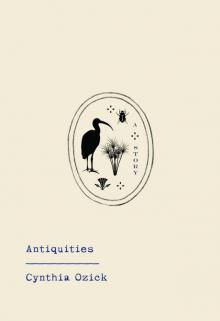 Antiquities
Antiquities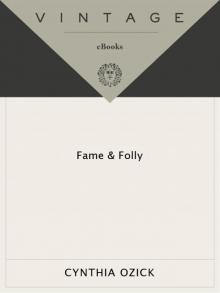 Fame & Folly
Fame & Folly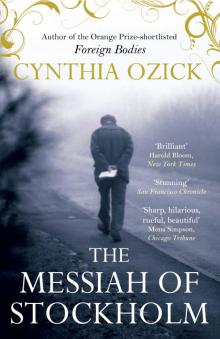 The Messiah of Stockholm
The Messiah of Stockholm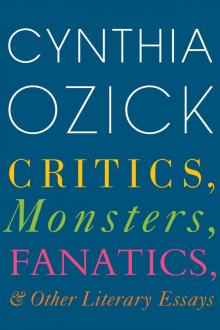 Critics, Monsters, Fanatics, and Other Literary Essays
Critics, Monsters, Fanatics, and Other Literary Essays Heir to the Glimmering World
Heir to the Glimmering World The Din in the Head
The Din in the Head Dictation
Dictation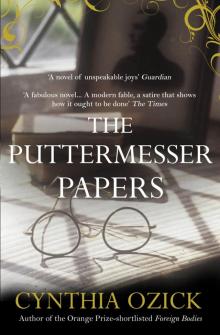 The Puttermesser Papers
The Puttermesser Papers Metaphor and Memory
Metaphor and Memory Art and Ardor
Art and Ardor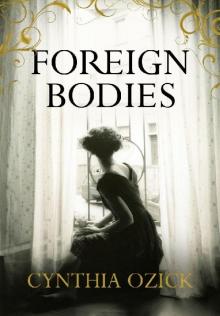 Foreign Bodies
Foreign Bodies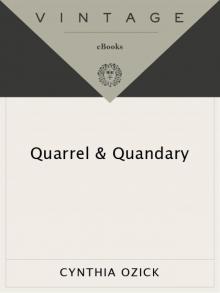 Quarrel & Quandary
Quarrel & Quandary